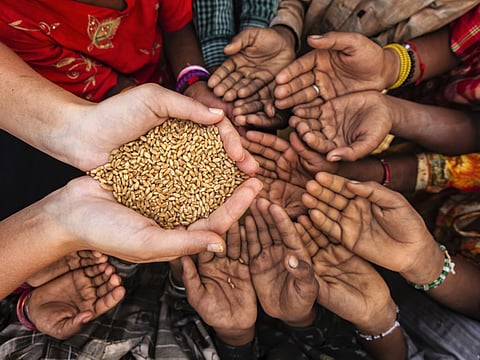Eradicating the menace of poverty
Swift actions by governments, international bodies and the private sector to translate sustainable development goals into effective policies is a must

While the world today seems rather precarious, and negative news seems to prevail on our screens and in our newspaper headlines, there are some important glimpses of light that deserve attention. One of these is the stunning decline in extreme poverty, defined as an earning of about less than $1.9 (Dh7.35) per person per day, according to the World Bank. For most of history, probably more than 90 per cent of the world population lived in extreme poverty, plunging to fewer than 10 per cent today. Nearly 1.1 billion people have moved out of extreme poverty since 1990.
2017 marks 25 years since the United Nations General Assembly declared October 17 as the International Day for the Eradication of Poverty. This year’s theme was ‘Answering the Call of October 17 to end poverty: A path toward peaceful and inclusive societies’. The year 2017 also marks the 30th anniversary of the Call to Action by Father Joseph Wresinski, which inspired the observance of October 17 as the World Day for Overcoming Extreme Poverty and the recognition by the United Nations of the day as the International Day for the Eradication of Poverty.
While poverty rates have indeed declined in all regions, progress has nonetheless been uneven with the reduction in extreme poverty between 2012 and 2013 being mainly driven by East Asia and the Pacific (noteably China and Indonesia) and South Asia (noteably India).
Global poor
Half of the world’s extreme poor live in sub-Saharan Africa. The number of poor in the region fell only by four million with 389 million people living on less than $1.90 a day in 2013 — more than all the other regions combined. Moreover, a vast majority of the global poor live in rural areas and is poorly educated, mostly employed in the agricultural sector, and more than half being under 18 years of age.
All is not lost, however.
We at Dubai Cares strongly believe that education is one of the most effective tools to breaking the cycle of poverty. According to the Global Partnership for Education (GPE), if all students in low-income countries left school with basic reading skills, 171 million people could be lifted out of poverty. In addition, if every child in low-income countries completed secondary school by 2030, income per capita would increase by 75 per cent by 2050 and poverty elimination would be brought forward by 10 years. The case for investment in education is therefore clear.
However, while more children today are in school around the world than ever before, 263 million children and young people are still out of school and approximately 130 million more children are attending primary school, but not learning and thus unable to read, write or do basic mathematics.
Acquired basic skills such as reading, writing and mathematics, have a documented positive effect on marginalised populations’ incomes. It increases the rate of return on the economy. Providing education to marginalised and poor populations will certainly bring changes to many of the systemic factors that have contributed to the delay in poor communities’ development. Education can prevent the transition of poverty between generations and have positive effect on health, nutrition and environmental protection. As such, education is an indispensable investment with life-long benefits that cannot be reversed. By investing in education, we can cut the number of global citizens living in poverty by 12 per cent, according to the World Bank.
Better opportunities
Education is a human right and is a critical factor in every child’s physical and intellectual development. When we ensure equal rights to education for girls and boys we are providing them with better opportunities in life, better health facilities and empowering them to play an active role in society. This belief is the cornerstone of Dubai Cares, and the driving force behind every single one of our programme interventions, which aim to provide access to and promote quality of education in developing countries across the world.
The voices of those living in extreme poverty have already been heard and recognised by the United Nation’s Agenda 2030 for Sustainable Development. We now need swift actions by governments, international bodies and the private sector to translate the Sustainable Development Goals into effective policies supported by appropriate resources. The 2030 Agenda is ambitious — we need ambitious measures to take it forward. We need to invest in global education now.
Tariq Al Gurg is the CEO of Dubai Cares.



